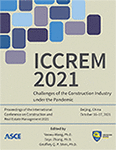Mitigating Influence of Institutional Differences on International Project Performance by Knowledge Management
Publication: ICCREM 2021
ABSTRACT
Under the pandemic of COVID-19, each country urgently restores its economies, and international project development has large marketing demand. Contractors need to understand the institutional differences between delivering domestic and international projects to fulfill the project implementation tasks. Existing studies on institutional differences mainly focuses on qualitatively describing the impact of institutional differences on project implementation. However, how institutional differences have influenced on international project performance is still unclear. With the data collected from 47 construction projects in 41 countries through questionnaires and interviews, this study has established and tested a theoretical model that incorporates knowledge management, institutional differences, project implementation problems, and project performance. The results show that institutional differences significantly increase project implementation problems, thereby influencing project performance; knowledge management can considerably reduce the project implementation problems arising from institutional differences, resulting in better project performance. The study results can theoretically help understand the relationships among institutional differences, knowledge management, and project performance, and practically guide contractors to appropriately mitigate the influence of institutional differences on international project performance by knowledge management approach.
Get full access to this article
View all available purchase options and get full access to this chapter.
REFERENCES
Alavi, M., and Leidner, D. E. (2001). “Review: knowledge management and knowledge management systems: conceptual foundations and research issues.” MIS Quarterly, 25(1), 107–136.
Atkinson, R., Crawford, L., and Ward, S. (2006). “Fundamental uncertainties in projects and the scope of project management.” International Journal of Project Management, 24(8), 687–698.
Chevrier, S. (2003). “Cross-cultural management in multinational project groups.” Journal of World Business, 38(2), 141–149.
Chen, C. (2008) “Entry mode selection for international construction markets: the influence of host country related factors.” Construction Management and Economics, 26(3), 303–314.
Georgy, M. E., Chang, L. M., and Zhang, L. (2005). “Utility-function model for engineering performance assessment.” Journal of Construction Engineering and Management, 131(5), 558–568.
Gold, A. H., Malhotra, A., and Segars, A. H. (2001). “Knowledge management: an organizational capabilities perspective.” Journal of Management Information Systems, 18(1), 185–214.
Hair, J., Ringle, C. M., and Sarstedt, M. (2011). “PLS-SEM: Indeed a silver bullet.” Journal of Marketing Theory and Practice, 19(2), 139–152.
Hair, J., Hult, G. T. M., Ringle, C. M., and Sarstedt, M. (2016). A primer on partial least squares structural equation modeling (PLS-SEM), Sage publications, Los Angeles.
Javernick-Will, A., and Levitt, R. E. (2010). “Mobilizing institutional knowledge for international projects.” Journal of Construction Engineering and Management, 136(4), 430–441.
Javernick-Will, A. N., and Scott, W. R. (2010). “Who needs to know what? Institutional knowledge and global projects.” Journal of Construction Engineering and Management, 136(5), 546–557.
Johanson, J., and Vahlne, J. E. (1977). “The internationalization process of the firm-a model of knowledge development and increasing foreign market commitments.” Journal of International Business Studies, 8(1), 23–32.
Lei, Z., Tang, W., Duffield, C., Zhang, L., and Hui, F. K. P. (2017). “The impact of technical standards on international project performance: Chinese contractors experience.” International Journal of Project Management, 35(8), 1597–1607.
Lord, M. D., and Ranft, A. L. (2000). “Organizational learning about new international markets: Exploring the internal transfer of local market knowledge.” Journal of International Business Studies, 31(4), 573–589.
Mahalingam, A., and Levitt, R. E. (2007). “Institutional theory as a framework for analyzing conflicts on global projects.” Journal of Construction Engineering and Management, 133(7), 517–528.
MOFCOM. (2020). “The Statistics of China’s contract foreign projects.” <http://data.mofcom.gov.cn/tzhz/forengineerstac.shtml> (Oct. 31, 2020).
Nemati, H.R. (2002). “Global knowledge management: exploring a framework for research.” Journal of Global Information Technology Management, 5(3), 1–11.
Orr, R. J., and Scott, W. R. (2008). “Institutional exceptions on global projects: a process model.” Journal of International Business Studies, 39(4), 562–588.
Park, J. G., and Lee, J. (2014). “Knowledge sharing in information systems development projects: Explicating the role of dependence and trust.” International Journal of Project Management, 32(1), 153–165.
Shen, W., Tang, W., Wang, S., Duffield, C. F., Hui, F. K. P., and You, R. (2017). “Enhancing trust-based interface management in international engineering-procurement-construction projects.” Journal of Construction Engineering and Management, 143(9), 1–12.
Sridharan, V. (2007). Construction market and construction firms in China: strengths, weaknesses and development trajectory, Stanford Univ., Stanford, CA.
Wang, T., Tang, W., Du, L., Duffield, C. F., and Wei, Y. (2016). “Relationships among risk management, partnering, and contractor capability in international EPC project delivery.” Journal of Management in Engineering, 32(6), 1–10.
Wang, T., Tang, W., Qi, D., Shen, W., and Huang, M. (2015). “Enhancing design management by partnering in delivery of international EPC projects: evidence from Chinese construction companies.” Journal of Construction Engineering and Management, 142(4), 1–12.
Zhang, Q., Tang, W., Liu, J., Duffiel, C. F., Hui, F. K. P., Zhang, L., and Zhang, X. (2018). “Improving design performance by alliance between contractors and designers in international hydropower EPC projects from the perspective of Chinese construction companies.” Sustainability, 10(4), 1–24.
Zhao, Z.Y., Shen, L.Y., and Zuo, J. (2009). “Performance and strategy of Chinese contractors in the international market.” Journal of Construction Engineering and Management, 135(2), 108–118.
Information & Authors
Information
Published In
Copyright
© 2021 American Society of Civil Engineers.
History
Published online: Dec 9, 2021
Authors
Metrics & Citations
Metrics
Citations
Download citation
If you have the appropriate software installed, you can download article citation data to the citation manager of your choice. Simply select your manager software from the list below and click Download.
